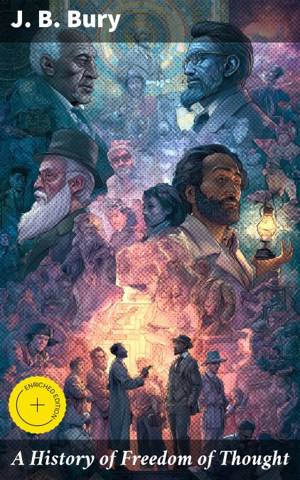
- Afhalen na 1 uur in een winkel met voorraad
- Gratis thuislevering in België vanaf € 30
- Ruim aanbod met 7 miljoen producten
- Afhalen na 1 uur in een winkel met voorraad
- Gratis thuislevering in België vanaf € 30
- Ruim aanbod met 7 miljoen producten
Zoeken
A History of Freedom of Thought E-BOOK
Enriched edition. Exploring the Evolution of Intellectual Freedom
J. B. Bury
E-book | Engels
€ 0,49
Uitvoering
Omschrijving
In "A History of Freedom of Thought," J. B. Bury embarks on an intellectual exploration of the evolution of human thought and the pursuit of intellectual autonomy. The book deftly navigates through historical epochs, showcasing the interplay between philosophical inquiry and societal constraints, highlighting pivotal moments that contributed to the emergence of free thought. Bury employs a narrative style that is both accessible and richly detailed, masterfully weaving together philosophy, history, and the socio-political climates that shaped various ideologies throughout the ages. The work serves as a critical examination of how freedom of thought has been constrained by dogma and authority, providing a thoughtful critique of both past and present challenges to intellectual liberty. J. B. Bury was a renowned historian and scholar, best known for his expertise in ancient history and the philosophy of history. His profound engagement with classical texts and fascination with the Enlightenment likely influenced his perspective on intellectual freedom. Bury's scholarly background, combined with his commitment to rationalism and the advancement of human thought, provided a rich foundation from which he approached this examination of freedom. This book is essential for anyone seeking a deeper understanding of the historical struggle for intellectual liberty. Bury's insightful analysis resonates not only with historians and philosophers but also with any modern reader grappling with the tensions between tradition and individual thought. "A History of Freedom of Thought" is a timeless reminder of the significance of intellectual freedom in fostering human progress and enlightenment.
In this enriched edition, we have carefully created added value for your reading experience:
- A succinct Introduction situates the work's timeless appeal and themes.
- The Synopsis outlines the central plot, highlighting key developments without spoiling critical twists.
- A detailed Historical Context immerses you in the era's events and influences that shaped the writing.
- A thorough Analysis dissects symbols, motifs, and character arcs to unearth underlying meanings.
- Reflection questions prompt you to engage personally with the work's messages, connecting them to modern life.
- Hand‐picked Memorable Quotes shine a spotlight on moments of literary brilliance.
- Interactive footnotes clarify unusual references, historical allusions, and archaic phrases for an effortless, more informed read.
In this enriched edition, we have carefully created added value for your reading experience:
- A succinct Introduction situates the work's timeless appeal and themes.
- The Synopsis outlines the central plot, highlighting key developments without spoiling critical twists.
- A detailed Historical Context immerses you in the era's events and influences that shaped the writing.
- A thorough Analysis dissects symbols, motifs, and character arcs to unearth underlying meanings.
- Reflection questions prompt you to engage personally with the work's messages, connecting them to modern life.
- Hand‐picked Memorable Quotes shine a spotlight on moments of literary brilliance.
- Interactive footnotes clarify unusual references, historical allusions, and archaic phrases for an effortless, more informed read.
Specificaties
Betrokkenen
- Auteur(s):
- Uitgeverij:
Inhoud
- Aantal bladzijden:
- 217
- Taal:
- Engels
Eigenschappen
- Productcode (EAN):
- 4057664122100
- Verschijningsdatum:
- 18/11/2019
- Uitvoering:
- E-book
- Beveiligd met:
- Digital watermarking
- Formaat:
- ePub

Alleen bij Standaard Boekhandel
Beoordelingen
We publiceren alleen reviews die voldoen aan de voorwaarden voor reviews. Bekijk onze voorwaarden voor reviews.








